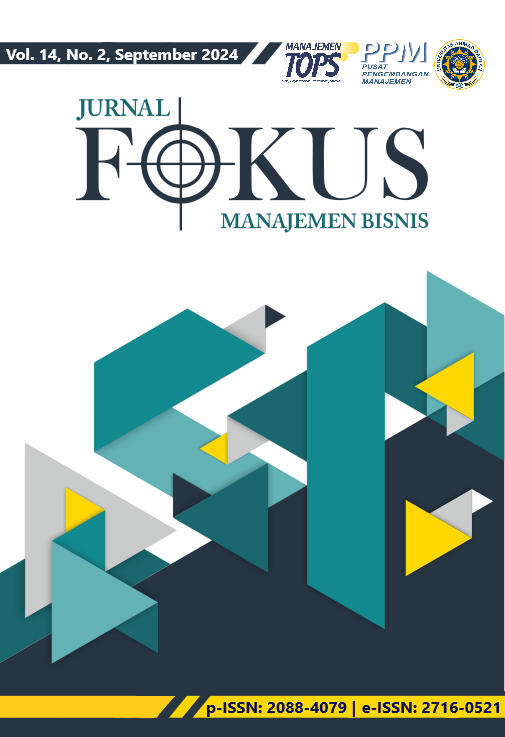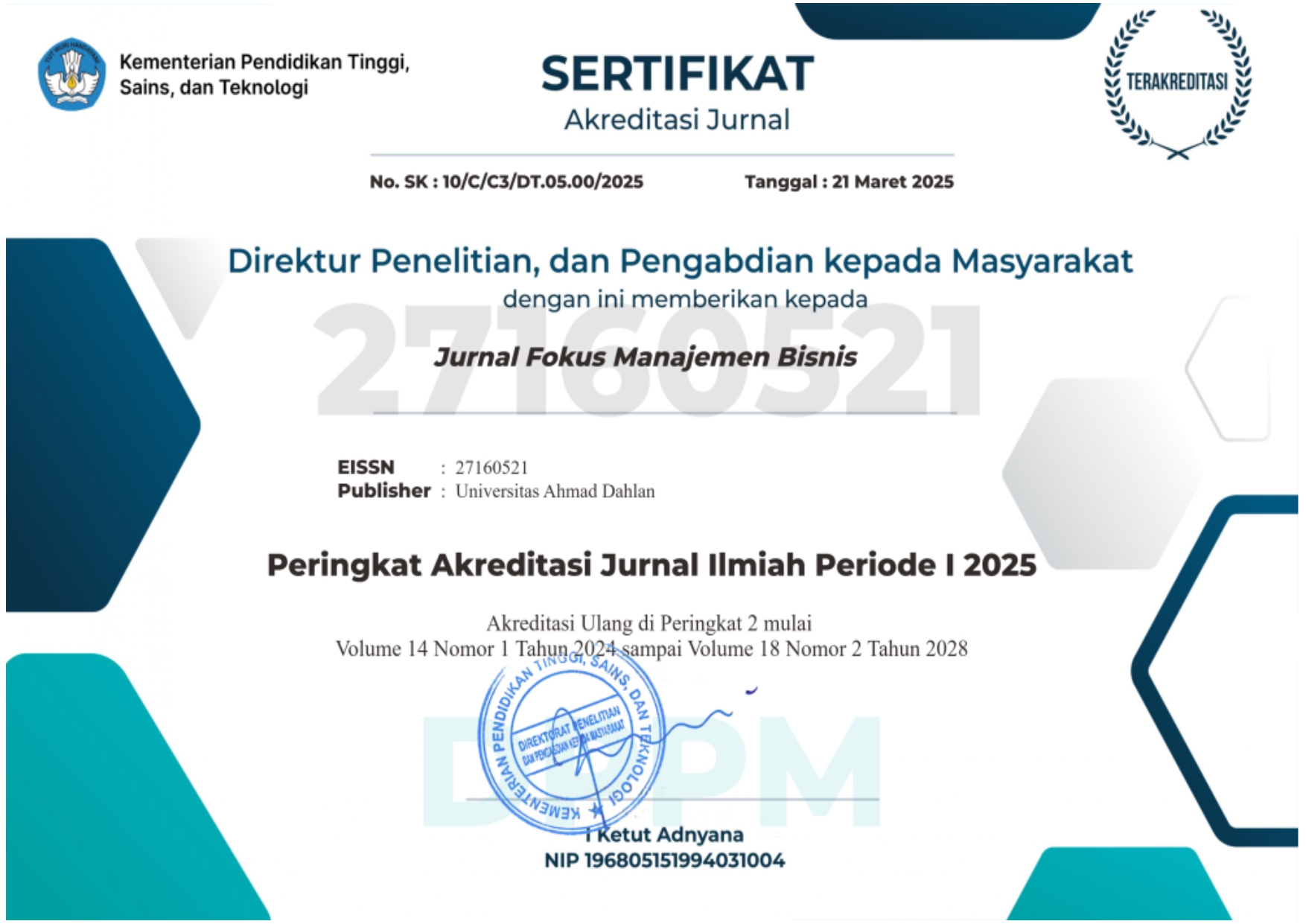The impact of techno complexity on work performance through emotional exhaustion
DOI:
https://doi.org/10.12928/fokus.v14i2.10479Abstract
Technology has become an integral part of work life, providing significant benefits for increasing productivity and competitiveness. However, the use of technology also carries risks, especially in the form of technostress, namely, the stress that arises from using technology. This study aimed to investigate the impact of technological complexity as a technostress trigger on work performance among employees in micro, small, and medium enterprises in Semarang, Indonesia, with emotional exhaustion as a potential mediator. The sample for this study consisted of 315 micro, small, and medium-sized enterprise workers in various sectors. Data were collected through surveys and analyzed using structural equation modeling and partial least squares. The research results show that technological complexity negatively affects emotional exhaustion, but does not significantly affect work performance. By contrast, emotional exhaustion negatively influenced work performance. However, there is insufficient evidence to support the mediation of emotional exhaustion between technological complexity and workplace performance. These findings emphasize the importance of considering additional factors beyond techno complexity in shaping work performance as well as the importance of organizational support in mitigating the negative impact of techno complexity on employee well-being and performance in micro, small, and medium-sized enterprises.
References
Adhiatma, A., Fachrunnisa, O., Nurhidayati, & Rahayu, T. (2023). Creating digital ecosystem for small and medium enterprises: The role of dynamic capability, agile leadership and change readiness. Journal of Science and Technology Policy Management, 14(5). https://doi.org/10.1108/JSTPM-12-2020-0171
Alonso, F., Esteban, C., Gonzalez-Marin, A., Alfaro, E., & Useche, S. A. (2020). Job stress and emotional exhaustion at work in Spanish workers: Does unhealthy work affect the decision to drive? PLoS ONE, 15(1). https://doi.org/10.1371/journal.pone.0227328
Alshaher, A., Alkhaled, H. R., & Mohammed, M. M. (2023). The impact of adoption of digital innovation dynamics in reduce work exhaustion in SMEs in developing countries: The case of cloud of things services. VINE Journal of Information and Knowledge Management Systems. https://doi.org/10.1108/VJIKMS-03-2022-0096
Bakker, A. B., & Demerouti, E. (2017). Job demands-resources theory: Taking stock and looking forward. Journal of Occupational Health Psychology, 22(3). https://doi.org/10.1037/ocp0000056
Bianchi, R., Schonfeld, I. S., & Laurent, E. (2015). Is it time to consider the “burnout syndrome” a distinct illness? Frontiers in Public Health, 3. https://doi.org/10.3389/fpubh.2015.00158
Borst, R. T. (2018). Comparing work engagement in people-changing and people-processing service providers: A mediation model with red tape, autonomy, dimensions of psm, and performance. Public Personnel Management, 47(3). https://doi.org/10.1177/0091026018770225
Busch, C., Dreyer, R., & Janneck, M. (2021). Blended recovery and burnout coaching for small-business copreneurs. Consulting Psychology Journal: Practice and Research, 73(1). https://doi.org/10.1037/cpb0000198
Caliskan, S. C., Arikan, S. C., & Saatci, E. Y. (2014). SMEs context of Turkey from the relational perspective of members perfectionism, work family conflict and burnout. International Journal of Business and Social Science, 5(4).
Chang, L. M., Hung, S. Y., & Hung, W. H. (2014). Critical stressors affecting work exhaustion of is employees in SMEs. 35th International Conference on Information Systems “Building a Better World Through Information Systems”, ICIS 2014.
Chen, H., Richard, O. C., Dorian Boncoeur, O., & Ford, D. L. (2020). Work engagement, emotional exhaustion, and counterproductive work behavior. Journal of Business Research, 114. https://doi.org/10.1016/j.jbusres.2020.03.025
De Massis, A., Audretsch, D., Uhlaner, L., & Kammerlander, N. (2018). Innovation with limited resources: Management lessons from the German Mittelstand. Journal of Product Innovation Management, 35(1). https://doi.org/10.1111/jpim.12373
Di Dalmazi, M., Mandolfo, M., Stringhini, C., & Bettiga, D. (2022). Influence of technostress on work engagement and job performance during remote working. International Conference on Human-Computer Interaction, 149–163.
Fernández-Fernández, M., Martínez-Navalón, J. G., Gelashvili, V., & Román, C. P. (2023). The impact of teleworking technostress on satisfaction, anxiety and performance. Heliyon, 9(6). https://doi.org/10.1016/j.heliyon.2023.e17201
Gaudioso, F., Turel, O., & Galimberti, C. (2017). The mediating roles of strain facets and coping strategies in translating techno-stressors into adverse job outcomes. Computers in Human Behavior, 69, 189–196. https://doi.org/10.1016/j.chb.2016.12.041
Hair, J. F., Sarstedt, M., Hopkins, L., & Kuppelwieser, V. G. (2014). Partial least squares structural equation modelling (PLS-SEM). European Business Review, 26(2), 106–121. https://doi.org/10.1108/EBR-10-2013-0128
Hernita, H., Surya, B., Perwira, I., Abubakar, H., & Idris, M. (2021). Economic business sustainability and strengthening human resource capacity based on increasing the productivity of small and medium enterprises (SMES) in Makassar city, Indonesia. Sustainability (Switzerland), 13(6). https://doi.org/10.3390/su13063177
Hur, W. M., Moon, T., & Jun, J. K. (2016). The effect of workplace incivility on service employee creativity: The mediating role of emotional exhaustion and intrinsic motivation. Journal of Services Marketing, 30(3). https://doi.org/10.1108/JSM-10-2014-0342
Kumar, S., & Shazania, S. (2021). The effect of emotional exhaustion towards job performance. Malaysian Journal of Consumer and Family Economics, 27(S1).
La Torre, G., De Leonardis, V., & Chiappetta, M. (2020). Technostress: How does it affect the productivity and life of an individual? Results of an observational study. Public Health, 189. https://doi.org/10.1016/j.puhe.2020.09.013
Ma, J., Ollier-Malaterre, A., & Lu, C. qin. (2021). The impact of techno-stressors on work–life balance: The moderation of job self-efficacy and the mediation of emotional exhaustion. Computers in Human Behavior, 122. https://doi.org/10.1016/j.chb.2021.106811
Macía-Rodríguez, C., Andreu-Ansola, J., Alejandre de Oña, A., Martín-Iglesias, D., Montaño-Martínez, A., & Moreno-Díaz, J. (2023). Burnout syndrome increase during COVID-19 pandemic in attending internal Medicine physicians. Revista Clinica Espanola, 223(5). https://doi.org/10.1016/j.rce.2022.12.009
Marchiori, D. M., Mainardes, E. W., & Rodrigues, R. G. (2019). Do individual characteristics influence the types of technostress reported by workers? International Journal of Human-Computer Interaction, 35(3). https://doi.org/10.1080/10447318.2018.1449713
Nasir, J., Ibrahim, R. M., Sarwar, M. A., Sarwar, B., Al-Rahmi, W. M., Alturise, F., Samed Al-Adwan, A., & Uddin, M. (2022). The effects of transformational leadership, organizational innovation, work stressors, and creativity on employee performance in SMEs. Frontiers in Psychology, 13. https://doi.org/10.3389/fpsyg.2022.772104
Özgür, H. (2020). Relationships between teachers’ technostress, technological pedagogical content knowledge (TPACK), school support and demographic variables: A structural equation modeling. Computers in Human Behavior, 112. https://doi.org/10.1016/j.chb.2020.106468
Park, H. I., & Nam, S. K. (2020). From role conflict to job burnout: A mediation model moderated by mindfulness. The Career Development Quarterly, 68(2), 129–144. https://doi.org/10.1002/cdq.12218
Parker, S. K. (2014). Beyond motivation: Job and work design for development, health, ambidexterity, and more. In Annual Review of Psychology, 65. https://doi.org/10.1146/annurev-psych-010213-115208
Pasini, M., Arenas, A., Brondino, M., Di Marco, D., Duarte, A. P., de Carvalho, C. V., & da Silva, S. (2022). A game-based approach to manage technostress at work. Methodologies and Intelligent Systems for Technology Enhanced Learning, 11th International Conference 11, 85–94.
Riaz, U., & Chaudhry, M. O. (2021). Role of small and medium enterprises (SME) in women empowerment and poverty alleviation in Punjab, Pakistan. International Journal of Agricultural Extension, 9(3). https://doi.org/10.33687/ijae.009.03.3655
Salmela-Aro, K., Rantanen, J., Hyvönen, K., Tilleman, K., & Feldt, T. (2011). Bergen burnout inventory: Reliability and validity among Finnish and Estonian managers. International Archives of Occupational and Environmental Health, 84(6). https://doi.org/10.1007/s00420-010-0594-3
Salo, M., Pirkkalainen, H., & Koskelainen, T. (2019). Technostress and social networking services: Explaining users’ concentration, sleep, identity, and social relation problems. Information Systems Journal, 29(2). https://doi.org/10.1111/isj.12213
Seidler, A., Thinschmidt, M., Deckert, S., Then, F., Hegewald, J., Nieuwenhuijsen, K., & Riedel-Heller, S. G. (2014). The role of psychosocial working conditions on burnout and its core component emotional exhaustion - A systematic review. Journal of Occupational Medicine and Toxicology, 9(1). https://doi.org/10.1186/1745-6673-9-10
Tarafdar, M., Cooper, C. L., & Stich, J. F. (2019). The technostress trifecta - techno eustress, techno distress and design: Theoretical directions and an agenda for research. Information Systems Journal, 29(1). https://doi.org/10.1111/isj.12169
Tarafdar, M., Maier, C., Laumer, S., & Weitzel, T. (2020). Explaining the link between technostress and technology addiction for social networking sites: A study of distraction as a coping behavior. Information Systems Journal, 30(1). https://doi.org/10.1111/isj.12253
Tarafdar, M., Pullins, E. B., & Ragu-Nathan, T. S. (2015). Technostress: Negative effect on performance and possible mitigations. Information Systems Journal, 25(2). https://doi.org/10.1111/isj.12042
Tarafdar, M., Tu, Q., & Ragu-Nathan, T. (2010). Impact of technostress on end-user satisfaction and performance. Journal of Management Information Systems, 27(3). https://doi.org/10.2753/MIS0742-1222270311
Torrès, O., Benzari, A., Fisch, C., Mukerjee, J., Swalhi, A., & Thurik, R. (2022). Risk of burnout in French entrepreneurs during the COVID-19 crisis. Small Business Economics, 58(2). https://doi.org/10.1007/s11187-021-00516-2
Wahl, I., Wolfgruber, D., & Einwiller, S. (2024). Mitigating teleworkers’ perceived technological complexity and work strains through supportive team communication. Corporate Communications, 29(3). https://doi.org/10.1108/CCIJ-05-2023-0061
Ya’acob, N. S., & Aziz, N. (2021). The technostress creator on educators’ job burnout in the virtual learning environment: A pilot study. Global Business & Management Research, 13(4), 306–317.
Yener, S., Arslan, A., & Kilinç, S. (2021). The moderating roles of technological self-efficacy and time management in the technostress and employee performance relationship through burnout. Information Technology and People, 34(7). https://doi.org/10.1108/ITP-09-2019-0462
Downloads
Published
How to Cite
Issue
Section
License
Copyright (c) 2024 Tiurma Yasinta, Firdaus Firdaus, Zulkifli Nurul Haqq, Pharatt Run

This work is licensed under a Creative Commons Attribution-ShareAlike 4.0 International License.
Authors who publish with this journal agree to the following terms:Â
- Authors retain copyright and grant the journal right of first publication with the work simultaneously licensed under a Creative Commons Attribution License that allows others to share the work with an acknowledgment of the work's authorship and initial publication in this journal.
- Authors are able to enter into separate, additional contractual arrangements for the non-exclusive distribution of the journal's published version of the work (e.g., post it to an institutional repository or publish it in a book), with an acknowledgment of its initial publication in this journal.
- Authors are permitted and encouraged to post their work online (e.g., in institutional repositories or on their website) prior to and during the submission process, as it can lead to productive exchanges, as well as earlier and greater citation of published work (See The Effect of Open Access).







